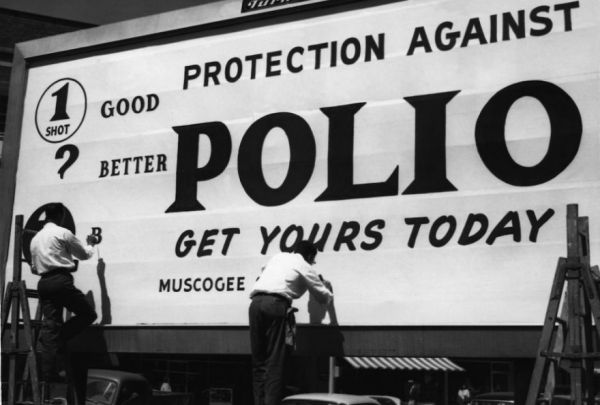
Sixty years ago on April 12, 1955, Dr. Thomas Francis of the University of Michigan made the announcement that
a polio vaccine had been created. The nation immediately celebrated the life-changing news.
If
it is difficult now to understand why that was so momentous, credit the
vaccine announced that day, and another one revealed soon after. In the
United States, polio killed or paralyzed thousands of children every
summer. In 1952, the worst year on record, it attacked 58,000 American
kids, closing pools and movie theaters, turning streets into ghost towns
as families fled crowded cities for sparsely settled summer colonies
where they imagined they would be more safe. Around the world, hundreds
of thousands more every year were mowed down by it; in societies with
few resources to treat the illness or support the disability that
followed, they faced a lifetime of mistreatment and poverty.
Scientists
had been working on the problem of polio for years, and while millions
of vaccinations ended the terror of the disease in the U.S., it took
decades to do so. Polio still exists in some parts of the world, and the
battle to eradicate it continues. Mary McKenna of the science blog
Germination
talked to one of the pioneering “polio warriors,” Dr. John Sever. Sever
knew both Dr. Jonas Salk and Dr. Albert Sabin, the inventors of two
polio vaccines, and was the founder of Rotary International’s campaign
against polio.
John Sever:
I was working on a PhD in microbiology and an MD at Northwestern
Medical School in the 1950s, so I was aware, of course, of polio. My
father had been a practicing physician in the Chicago area, and I had a
cousin who had polio paralysis of her legs, so it was very much a
personal experience as well as professional. I remember that parents
with newborns could buy “polio insurance” against the possibility their
child would develop polio, so they could pay for the cost of care. It
was on everyone’s mind, that children would be paralyzed and have to be
in “iron lungs,” or die.
In the interview, he tells
what those early days of polio vaccination were like and how it grew
from an emergency measure to a global eradication project.
Read the story of the polio breakthrough, and then take a minute to be thankful for the miracle of modern science.
 Sixty years ago on April 12, 1955, Dr. Thomas Francis of the University of Michigan made the announcement that a polio vaccine had been created. The nation immediately celebrated the life-changing news.
Sixty years ago on April 12, 1955, Dr. Thomas Francis of the University of Michigan made the announcement that a polio vaccine had been created. The nation immediately celebrated the life-changing news.
No comments:
Post a Comment